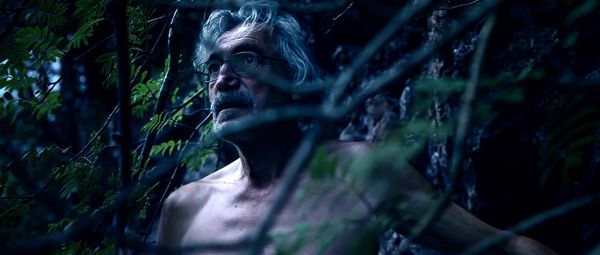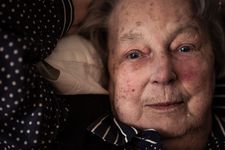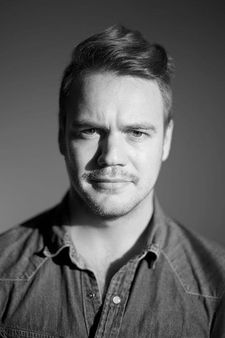 |
| Garnet Frost: 'It does sum up for me some elements of my life story that I wouldn't have been able to realise without it - it's like a form of psychotherapy in a way' |
Catching up with them after the premiere, I asked them how their film began.
Ed Perkins: It's taken four years from first meeting Garnet to getting it on screen. Four years ago, I was a development producer for a company in London and was actively searching for TV stories and desperately searching for a story that I felt could actually become a feature-length documentary film because I think it's a very high bar to get over. Not many films deserve to be told over an hour, I think.
I heard from a colleague that there was this very extraordinary, eccentric man who was talking in a pub in London about this amazing journey to Scotland that he wanted to undertake in search of lost gold. Immediately, my ears pricked up and I thought, I've got to meet this guy, he sounds fantastic. So, through my colleague, we arranged a meeting. I turned up at Garnet's front door and he was there. And from that moment, just under four years ago, every few weeks, I would go back and film more with Garnet.
It's been a long, slow process but it's been such an enormous privilege to be allowed into his world. I immediately became captivated by this unique, very evocative, enigmatic world that Garnet lives in. He surrounds himself with art and poetry and an amazing group of friends. And he has this extraordinary mother, who talks so profoundly and poetically, and I felt that I owed it to Garnet to try to tell his story in a way that was as poetical and lyrical as the world in which he lives.
The documentary is as much a doc about Garnet's mum and a tribute to her as it is to you. Were you surprised by the way that went.
 |
| Ed Perkins: 'I spent a lot of time talking to his mum and it struck me that she acts like a sort of oracle figure in the film' |
So it was trying to find the best way of telling that. And while I was searching for bigger themes in the story - and I'm not sure Garnet knew what those themes were in the beginning - I spent a lot of time talking to his mum and it struck me that she acts like a sort of oracle figure in the film. She knows from minute one what the journey is about and she teases it out but she knows her son better than anyone and she's a remarkable woman in her own right. I thought it was important to include her in the story.
You're very complementary characters, you and your mum, Garnet, in the sense that, certainly at the start of the film, you seem quite sad and melancholy about life and regretful that it's almost over in a way. Yet your mum, even though she's considerably older and has some health issues, has a very positive, embracing attitude to life.
GF: I wasn't aware I was quite as bad as that but looking at myself on the film, I seem to come over as a rather sort of tortured person, deeply melancholy and so on and I certainly haven't inherited that from my mum. She's a very upbeat sort of person, so I guess we kind of complement one another like that.
Is it funny watching the film and to see yourself back at the start of the journey?
GF: Ed made a point of not showing me any of the rushes as we went along because he didn't want me to start getting too self-conscious about what I was saying on camera. I knew what I was trying to do in terms of the search for the gold and so on and I was aware of the stuff that Ed was filming and I had a picture in my mind's eye of what it might amount to.
But when it came to actually seeing the film, that was like a revelation for me. I spent a lot of time just thinking, do I really look like that? Do I really sound like that? Am I really that sort of introspective person? I don't see myself as others see me, so that was a bit of a surprise for me.
Not an unpleasant one, this is a portrait that the editor has painted of me and he's painted it in his own style and his own palette. Nevertheless, warts and all, it's a fair portrait and a good portrait. It does sum up for me some elements of my life story that I wouldn't have been able to realise without it - it's like a form of psychotherapy in a way. Ed has been able to piece it together and tell it the world but also tell it back to me.
You use quite a lot of nature photography in the film - did that grow with the film?
EPThere were very conscious decisions early on in the film to juxtapose London and Scotland - through the sound design and through imagery. I always wanted Scotland to feel like a dreamscape, slightly ethereal and otherworldly. So when we shot in London I shot everything very close - it feels very claustrophobic. The colours are browns, sepias, very cold - it's quite gritty and quite tough.
Even though we're in London and we're surrounded by millions of people, there's a kind of loneliness there. Then we go up to Scotland and suddenly the colours are saturated, warm greens, reds and yellows. And instead of being close to Garnet's face, the camera comes right back and Garnet becomes a very small silhouette often in this enormous landscape. The irony and what I thought was interesting is that we go from a place with millions of people and he feels quite lonely but suddenly in a vast landscape where there is no one, suddenly he's surrounded by life - by running water and by nature. So that was the focus on little spiders and midges.
You look as though you got ravaged by midges.
GF: Yes, tremendously. We went at the wrong time of the year really. It was late in August and we should have been there in June but it didn't work out that way. This business about the nature - Scotland's a wonderful place and if you go up there with a camera you can't help but capture it, that's what's there on offer. Part of the essence of the story in a way is to do with a return to nature or a troubled urban soul rediscovering his own inner nature by a process of re-engaging with the natural world. This business of getting into the stream and so on are archetypal images to do with renewal. A bit like The Tempest or something. By reconnecting physically with nature, the protagonist reconnects with his inner nature.
And you felt you did?
GF: Yes, I do. Perhaps not as totally or as majestically as could be implied by the film but what you see is what happened and it is an incredible landscape. For me, as an urban person, to go there and become absorbed in it, to sit there and be part of the landscape and meditate on it is refreshing to the soul.
Was it difficult having the camera there? Especially, when you have a list where you say you're going to go alone to try to find the spot where you found the staff.
GF: By the time we got up there, I was pretty used to it. Ed and I had a rapport. I didn't mind the camera, partly because he never showed me what he shot, so I had nothing to be afraid of. I just imagined. I didn't feel particularly self-conscious about that. I did feel self-conscious about speaking sometimes, especially having to bear my chest and stick this thing [the microphone] on me, made me feel a bit disconcerted.
Presumably you were prompting him with questions, Ed?
EP: Yes. Certainly in London we spent a lot of time sitting and talking. What I tried consciously to do, especially when we got up to Scotland, when we got to the most poignant moments, is to resist the normal documentary temptation of going and putting the camera in Garnet's face and saying, "How do you feel?" I didn't want to know how he felt or the audience to know how he felt - I wanted to embrace that ambiguity. I personally love stories that in which you, as the audience are forced to think for yourself, and you're given the respect to think through the emotions of the character on screen. I think it's a more powerful way of allowing the story to relate to your own life if you're forced to think through it. So there were times when I was asking questions but I tried as much as possible to stay back.
It's a very hands-off documentary.
 |
| 'Part of the essence of the story in a way is to do with a return to nature' |
By this point, you must have been emotionally invested in it - it must have been an emotional journey for you as well?
EP: Yes, but a privilege at every stage. I can't thank Garnet enough for allowing me into his life. I think it's hard to understand how brave you have to be to bear your soul on camera and I can't thank Garnet enough for trusting me with that. It's a huge privilege and responsibility and it wasn't one that I took lightly because the kind of emotions that Garnet is talking about a very important, they're central to his life.
Were you ever worried about Garnet because he was seeming quite melancholy?
EP: I was concerned because I came to love him in my own special way. When you come to these films, as a filmmaker you try to stay emotionally detached. You say to yourself, I can tell this story most efficiently, most objectively by staying emotionally detached and that didn't happen with this film at all. I'm not going to try to say that it did. I did become emotionally attached, I did care about Garnet, I felt like we went on this journey together and I think it's probably allowed us to create a slightly different kind of documentary.
It definitely is a more emotional film, than many documentaries.
GF: Ed's being quite modest here because it's true that the documentary is unusual in as much as the filmmaker is to all intents and purposes completely invisible. So, it's a film about me made by this invisible person, but in fact looking at it, I think that Ed himself is there in every frame, discreetly in some way or another, so it's his story because it's very much his interpretation of the story. That suggests to me that the essence of the story is as much about him as it is about me.
I imagine the film will go on to play a lot of film festivals.
EP: We never went into this with the intention it would take us somewhere else. We were both quite naive when we went into it. We didn't really know what we were doing. Garnet had never been in a film and it was my first film - we kind of stumbled into it a bit. We certainly weren't thinking too far ahead, for better or worse. I know that we've put down the camera and finished filming finally but I do think just being in New York and being invited to such a prestigious festival is all part of whatever journey Garnet is going on.
It's very humbling and I'm very proud to see Garnet get the recognition I think he deserves and hasn't had for a long time in his life. We had our world premiere last night and Garnet got up at the end and had a standing ovation from people he'd never met. And all night, people were rushing up to him and giving him a hug and saying thank you for sharing your story with me. I think that's remarkable.
A lot of documentaries are about very worthy subjects and they're cause-driven films and documentaries should be about that but there should also be space in the documentary genre, I think, for stories about ordinary people with ordinary lives. Because - and I'm not saying we've done this - these ordinary stories can relate to people in quite a profound way and I hope we can see Garnet's story as a mirror in which we see our own hopes and dreams and possibly fears for our own life. Themes that are thrown up in Garnet's life are things that we confront in our own lives.
Now you've done this life-changing project, what's next for you?
 |
| Garnet: 'I think that Ed himself is there in every frame, discreetly in some way or another, so it's his story because it's very much his interpretation of the story' |
What's next for you, Ed? More documentaries?
EP: Simon Chinn our amazing producer, he's made some of the best documentary films ever made [his credits include Searching For Sugar Man and Man On Wire] and it's been an enormous privilege to work with him, and he's been instrumental in the film reaching where it has. He and I are developing some more feature documentary ideas. It's strange, I've been doing other things on and off but this has just consumed my life for four years, emotionally as well as day to day work and it's odd for it to have come to an end. It feels strange. We're obviously enjoying being here but there was always in my mind, if I was having a bad day at work, well, tomorrow I'm going off with Garnet. That was may kind of personal release and my way of being creative.
There are very brilliant documentaries that are being made all over the world by far braver people that I, in war zones, highlighting very important issues and that's immense and I'm not brave enough, if I'm honest, to be telling those stories. But I do think the kinds of stories I'm personally interested in are ones like Garnet's. Ones that are more personal, maybe more normal and ones that I feel can have an emotional impact on audiences and can make audiences think about their own lives.
Garnet's Gold will screen again at Tribeca Film Festival on Saturday, April 26, at 4pm in the Bow Tie Cinema Chelsea. For further details about future screenings and more information about the film, visit the official site and Facebook page.
Watch the trailer:





















